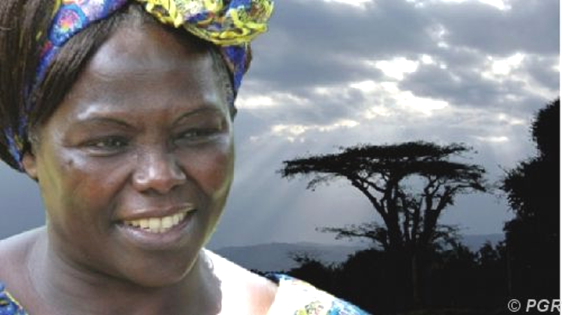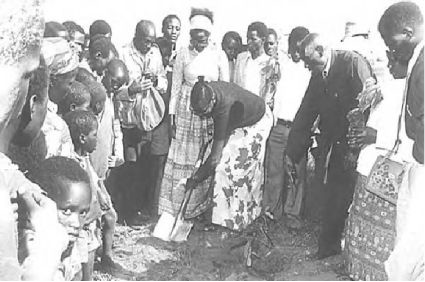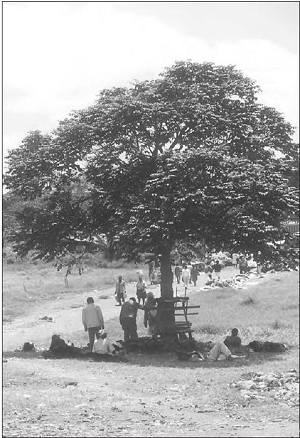Feb 05, 2026
Feb 05, 2026

Professor Wangari Maathai , the Kenyan environmentalist, social activist, founder of Green Belt Movement (GBM) and the 2004 Nobel prize winner for peace died of Ovarian cancer on 25th September. I was overwhelmed with sadness when I heard this news. In every sense this 71 year old woman who radiated charisma, conviviality and hope among millions was the greatest African who ever lived. Ever since I read her book, " The Green Belt Movement: Sharing the Approach and the Experience", this visionary leader had become a kind of hero to me.
Wangari Maathai's exceptional insight that the lives of Kenyans - and, by extension, of people in many other developing countries - would be made better if economic and social progress went hand in hand with environmental protection still echoes in all environmental platforms that deliberate sustainability issues of our green planet.
Wangari Muta Maathai was born on April 1 1940 in the village of Ihithe, near Nyeri, in the central highlands of Kenya. Her parents were subsistence farmers from the Kikuyu tribe. She was the eldest of six children, and in most families would not have attended school. But one day her elder brother, Nderitu, wanted to know why he had to go to school when Wangari did not. She was soon being taught by Catholic missionary nuns at Loreto Limiru Girls’ High School, from which she graduated in 1959.
After her graduation, she planned to attend the University of East Africa in Kampala, Uganda. However, the end of the colonial period of East Africa was nearing, and Kenyan politicians, such as Tom Mboya, were proposing ways to make education in Western nations available to promising students.
John F. Kennedy, then a United States Senator, agreed to fund such a program through the Joseph P. Kennedy Jr. Foundation, initiating what became known as the Kennedy Airlift or Airlift Africa. Maathai became one of about 300 Kenyans chosen to study at American universities in September 1960.
Maathai received a scholarship to study at Mount St. Scholastica College (now Benedictine College), in Atchison, Kansas. At Mount St. Scholastica, she majored in biology. After receiving her Bachelor of Science degree in 1964, she was accepted to the University of Pittsburgh to study for a master's degree in biology.
In January 1966, Maathai completed her studies at the University of Pittsburgh, earning a Master of Science in Biological Sciences and came back to Nairobi to become a research assistant. In 1971, she became the first Eastern African woman to receive a Ph.D., when she was granted a Doctorate of Anatomy from the University College of Nairobi, which became the University of Nairobi the following year. She continued to teach at the university, becoming a senior lecturer in Anatomy in 1974, chair of the Department of Veterinary Anatomy in 1976 and associate professor in 1977.
In 1972, the environmental movement in Africa took a major step forward: the United Nations Environment Programme (UNEP) was established in Nairobi as a result of the United Nations Conference on Human Environment held in Stockholm in the same year. This development helped arouse interest in the environment in Africa despite the fact that many governments in the region were not in favor of the policies adopted in Stockholm to curb environmental degradation. They argued that the Northern industrialized countries were hindering the industrialization and development of Africa by introducing anti-development policies and conditions. The establishment of UNEP in Nairobi attracted a few Northern NGOs that wanted to establish close working ties with UNEP as well as ensure that the agreements made in Stockholm were implemented. To achieve this, the NGOs established a center called the Environment Liaison Centre (ELC) and elected themselves as the first board members. Since they resided in the North, however, they decided to involve local persons who could become alternate board members and supervise the day-to-day running of the organization. At the time, Wangari was serving as the Director of Kenya Red Cross-Nairobi Branch, and, with the invitation of Oscar Mann, she accepted an invitation to join the ELC board and soon she was elected as chairman of ELC.
It was not until 1974 that Wangari began to focus on issues of forestation and reforestation in Kenya. During that time she was involved in a political campaign to elect Mwangi, her husband, as a Member of Parliament for Lang’ata, a constituency in Nairobi province. During the campaign meetings she discussed with people many of the constituents’ concerns, the most frequent being lack of employment for them and their children, and assured them of commitment to provide adequate solutions. Wangari took the political promises that she made to the voters seriously and agonized over finding ways to have them fulfilled, especially when her husband won the election.
At first this took the form of creating an informal employment agency, finding jobs for the very poor in the houses of the well-off. But when this foundered, Wangari Maathai began to focus on the vicious circle that links poverty, hunger, environmental collapse and women’s status. She saw how in poor families women scavenged for firewood to cook, eventually wandering further and further from home to find it. As more and more trees are felled, soil erosion leads to desertification; fewer cooked meals, meanwhile, results in malnutrition.
She decided to break this chain of impoverishment, developing a simple tree-planting programme. She took initiative along with some of her friends to establish the first tree nursery to enable them employ Lang’ata constituents to plant trees in the non-forested areas of the city. It then led to formation of Envirocare Ltd., a company that was going to hire constituents to clean up the homesteads of residents in Lang’ata as well as plant trees where necessary. Envirocare, which was headquartered in her home, was also supposed to provide a forum for their interaction with the Lang’ata constituents.
In 1977, she became an EXECOM member of the National Council of the Women of Kenya (NCWK). In one meeting, she highlighted tree planting as a potential activity for NCWK. She proposed it as a project that would especially help its women members in the rural areas to inexpensively meet many of their needs, including wood fuel, building and fencing material and soil conservation. Also the problem of malnutrition, especially among children and the elderly, in Central province was significant due to increased mismanagement cash-crop farming at the expense of subsistence farming.
NCWK embraced her idea, initiating what was soon called the Green Belt Movement (GBM). NCWK initially called the campaign “Save the Land Harambee.” The motto was -' Tree-planting campaign through the Harambee spirit.' Harambee means “Let us all pull together!” in Kiswahili language. Rather than collect funds for community projects, Kenyans were encouraged to collectively re-dedicate themselves to save their country from the threat of desertification through their active participation in forestation and reforestation. At every tree-planting ceremony, the participants reaffirmed their dedication to this cause by reciting the following committal:
"Being aware that Kenya is being threatened by the expansion of desert-like conditions; that desertification comes as a result of misuse of the land and by consequent soil erosion by the elements; and that these actions result in drought, malnutrition, famine and death; we resolve to save our land by averting this same desertification through the planting of trees wherever possible. In pronouncing these words, we each make a personal commitment to save our country from actions and elements which would deprive present and future generations from reaping the bounty [of resources] which is the birthright and property of all. "
The first Save the Land Harambee tree-planting ceremony took place in in a small park in Nairobi on World Environment Day, June 5, 1977.

The second GBM- Founder of Men of Trees, Njonjo planting a tree. WM can be seen in white head band (Source: from her book on GBM)
In September 1977, the second green belt was established when Kenya hosted the United Nations Conference on Desertification in Nairobi. At the conference, NCWK representatives focused on the problems that the ordinary rural population was facing due to desertification. As part of its contribution to the conference, NCWK organized a tree-planting activity in Naivasha, where, with the financial support of Mobil Oil of Kenya, delegates established a green belt. This was done on land owned by a cooperative of about 800 rural women from Kiambu—a district that borders Nairobi province. The event was a historic and memorable occasion for Save the Land Harambee and indeed for the delegates. Among those who planted trees on that day were Richard St. Barbe Baker, founder of Men of the Trees, and his co-founder, Ex-Senior Chief Josiah Njonjo.

One of the very first seven trees planted during GBM (from her book on GBM)
Shortly after the conference, a heightened national campaign followed that aimed at informing the public of the dangers of desertification and the necessary actions that needed to be taken at the community level to fight the process. This was done through the mass media and oral communication. As a result, many women’s groups responded positively, and Save the Land Harambee began to spread quickly in various parts of the country.
It then branched out, offering free seedlings to women across the country. For every tree that survived more than three months (about 80 per cent in fertile areas) the women tending them were paid a few pennies. The more trees they planted, the more they made. As they were encouraged to plant more than they would need for firewood, women were soon able to earn extra from selling the surplus. Not only did the scheme reverse deforestation but, for the first time, many women discovered financial autonomy.
The movement was helped to expand by a small UN grant that allowed it to develop nurseries for its seedlings. Eventually thousands of nurseries were set up across the country. By the early 1990s, offshoots of the campaign were being established in a dozen other countries in sub-Saharan Africa. Thus the Green Belt Movement which she founded in 1977, has planted an estimated 45 million trees and helped over 1 million women to establish tree nurseries and plant trees to reverse the effects of deforestation in Kenya.
Alongside her environmental campaigns, professor Maathai also worked to empower individuals and communities. Thus the achievements of GBM are manifold - Rural forestation and reforestation, Creation of employment within the Movement, Community mobilization, Raising awareness of the need to protect local biological diversity of plants and food crops, Improving image of women, increased advocacy and networking activities and above all inspiring the world by communicating that even the smallest can be change agents for improving the lives of millions.
One of the most wonderful things she did in the GBM process was to make ordinary people become seedling producers, what she called “foresters without diplomas.” For many years her main focus was to try to make people understand the linkage between good governance and conservation—how an environment that is well managed helps to sustain a good quality of life.
Her personal life suffered a setback in 1977 when her husband, Mwangi Mathai, left her. After a lengthy separation, in 1979 he sued for divorce, saying she was too strong-minded for a woman and that he was unable to control her. The judge in the divorce case agreed with the husband. Shortly after the trial, in an interview with Viva magazine, Maathai referred to the judge as either incompetent or corrupt. The interview angered the judge, and she was charged with contempt of court, found guilty, and sentenced to six months in jail.
After three days in Lang'ata Women's Prison in Nairobi, her lawyer formulated a statement, which the court found sufficient for her release. Shortly after the divorce, her former husband sent a letter via his lawyer demanding that Maathai drop his surname. In defiance, she chose to add an extra "a" instead.
She also fought against the corrupt Daniel Arap Moi regime in a bid to prevent powerful politicians from taking natural resource-rich land, such as forests and land suitable for farming from local people, which led her to be arrested and beaten on several occasions. In 1989 President Moi announced a plan to build a 62-storey skyscraper and office complex, complete with a statue of himself, in Uhuru Park, one of the few green spaces in central Nairobi. Wangari Maathai immediately began rallying opposition to the “park monster”; Moi retaliated that it was “un-African and unimaginable for a woman to challenge or oppose men” and ordered the GBM out of its offices. But foreign investors soon took fright at the negative publicity and the project was shelved.
From that time on Wangari Maathai turned to political activism on many fronts – calling for multiparty democracy and intertribal reconciliation, and campaigning with women who claimed their sons were the victims of wrongful arrest. '
In January 2002, Maathai returned to teaching as the Dorothy McCluskey Visiting Fellow for Conservation at Yale University's School of Forestry and Environmental Studies. She remained there until June 2002, teaching a course on sustainable development focused on the work of the Green Belt Movement.
Upon her return to Kenya, Maathai again campaigned for parliament in the 2002 elections, this time as a candidate of the National Rainbow Coalition, the umbrella organization which finally united the opposition. On December 22, 2002, the Rainbow Coalition defeated the ruling party Kenya African National Union, and in her constituency Maathai won.
In January 2003, she was appointed Assistant Minister in the Ministry for Environment and Natural Resources and served in that capacity until November 2005.
On 8 October 2004, Wangari Maathai was awarded the Nobel Peace Prize for her contribution to sustainable development, democracy and peace.
In 2006, with the United Nations, she launched a new “billion tree” campaign, which met its target within a year; today almost 12 billion trees have been planted under its auspices.
Wangari Maathai has won several honors, including Japan’s Order of the Rising Sun, the Légion d’honneur and the Nelson Mandela Award for Health and Human Rights; she received honorary doctorates from Yale University, Ochanomizu University in Japan, and the University of Norway, among others.
Her transition is a colossal loss to humanity. In a moving message, Achim Steiner, UN Under-Secretary General and UNEP Executive Director, said: "Wangari Maathai was a force of nature. While others deployed their power and life force to damage, degrade and extract short term profit from the environment, she used hers to stand in their way, mobilize communities and to argue for conservation and sustainable development over destruction.She was, like the acacias and the Prunus Africana trees Wangari fought so nobly and assiduously to conserve, strong in character and able to survive sometimes the harshest of conditions. She was also immovable in the face of ignorance, political gamesmanship and wanton environmental destruction"
Wangari Maathai often compared her life to that of a humming bird. For the animated movie "Dirt!" she tells this story. When fire breaks out in a huge forest, all the animals flee, except the hummingbird. The little bird flies back and forth, its beak filled with water. The other animals are terrified into inaction. When they ask what the hummingbird can possibly do with its small beak, the little bird answers, “I am doing the best I can.”
Professor Maathai adds, “I certainly don’t want to be like the animals watching as the planet goes down the drain. I will be a hummingbird. I will do the best I can.”
She practiced what she taught and was thorough, consistent and unwavering in her beliefs and convictions and made a difference in the lives of millions in this world.
Wangari Maathai has planted her last tree, but she will never stop cultivating inspiration in the hearts of all who care about justice for the earth and its people.
References:
The Green Belt Movement: Sharing the Approach and the Experience by Wangari Maathai
Unbowed by Wangari Maathai
Obituaries from various News Dailies
Photos, excepting the ones cited, are from the net
01-Oct-2011
More by : P. G. R. Nair